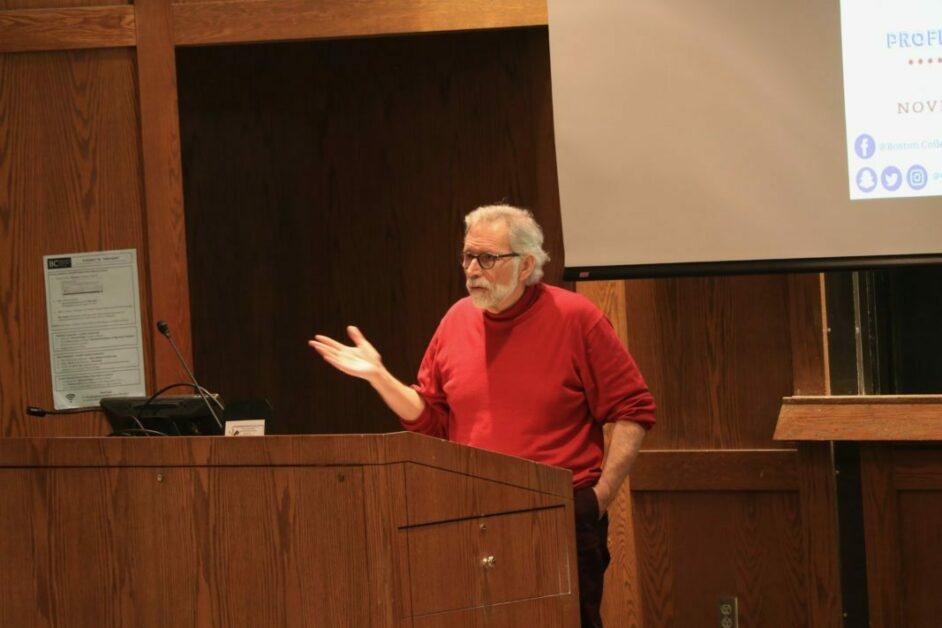“After a generation and more of diversity programs and diversity talk, I would argue that we’ve put African Americans, in particular, at a disadvantage as a result of this emphasis on diversity,” Skerry said at a virtual event hosted by BC Republicans.
With this increase in diversity talk, Skerry said, all minority groups that stand on the opposite side of white supremacy are being lumped together into one group. This has resulted in the dismissal of the specific needs of each minority community.
“That development has not only managed to alienate and arouse the anger and even animosity of large numbers of white Americans, but it has also managed to marginalize and put to one side, overlook, if not exactly ignore, the specific challenges facing African Americans and the specific obligations that we as Americans have to African Americans,” Skerry said.
Skerry said that though he does not deny the challenges faced by African Americans today, excessive conversations about diversity do not do much to specifically help the African American community.
“Even though I have deep reservations and criticisms of both BLM and the 1619 Project, I do take them seriously as evidence, as cries, as demands that African Americans have been neglected in American life,” Skerry said.
Skerry then referenced a study on police-related killings of African Americans by Franklin Zimring, a law professor at the University of California, Berkeley. The study finds that the death rate at the hands of the police for African Americans and Native Americans are twice their share of the population.
“That is one example of what I am trying to draw your attention to,” Skerry said. “That the situations, context, and lives of African Americans are different from and not to be easily likened to or equated to the challenges and obstacles that undeniably other groups experience, Hispanics in particular.”
Noting the importance of such findings, he claims that we are forgetting the data in lumping all minority groups into a single, victimized category.
“Such findings are obscured and have been obscured by the diversity talk that we got accustomed to, the language about people of color, using that as a frame to talk about, define, and even analyze these situations,” Skerry said. “We talk about and use this frame of people of color and regard all these very differently situated groups as similarly disadvantaged, and as I am trying to suggest, I think that is not accurate and also renders a disservice to African Americans.”
Skerry related this idea to the increasing hate crimes against Asian Americans as a result of the COVID-19 pandemic. Their current situation and history is much different than that of African Americans and must not be equated, he said.
“I would argue that we should not easily or readily collapse the history and present circumstances of Asians in America into a larger narrative about people of color,” Skerry said. “I think that narrative obscures, again, the uniquely compelling claims that African Americans have on the rest of American society.”
Skerry claims that this lumping of minority groups came as a result of the post-civil rights era in the 1970s. One such policy that played a large role has been affirmative action, which was developed for African Americans but then extended to Hispanics, Asians, and other disadvantaged groups, according to Skerry.
“The origins of this framework, this perspective, this template that we’ve all come to use and take for granted of course traces back to the 1970s and the post-civil rights era and the policies and institutions that were put in place either at the very end of that era or in the years immediately following,” Skerry said. “What I have in mind, of course, are various kinds of affirmative action programs.”
Though he currently supports affirmative action programs for African Americans, Skerry said he believes the extension of the programs to other groups is what has caused people to so easily equate the difficulties for African Americans to difficulties for other minority groups.
“I am not denying the disadvantages and mistreatment that other groups have encountered,” Skerry said. “But I am saying that they should not be so readily and unreflectively likened to or equated with the problems and challenges that African Americans have faced.”
The problem of forgetting about differences between communities also applies to how people think about Hispanics, according to Skerry. He claims that the title ‘Hispanic’ was created by political actors looking to lump very different people into one victimized category.
“This supergroup is made up of many different groups–Mexicans, Cubans, Puerto Ricans, Salvadorans, Central Americans, and Venezuelans–and there are differences among them we would want to pay attention to if we wanted to focus on this seriously,” Skerry said.
Skerry closed by saying that this talk of diversity that forgets about the specific needs of the African American community is damaging our efforts to mend the deep damage caused by America’s history.
“We are obscuring from view the most important and more enduring debt and obligation we have: to the descents of those who began their journey in America as slaves,” Skerry said.
Featured Image by Taylor Perison / Heights Archives







